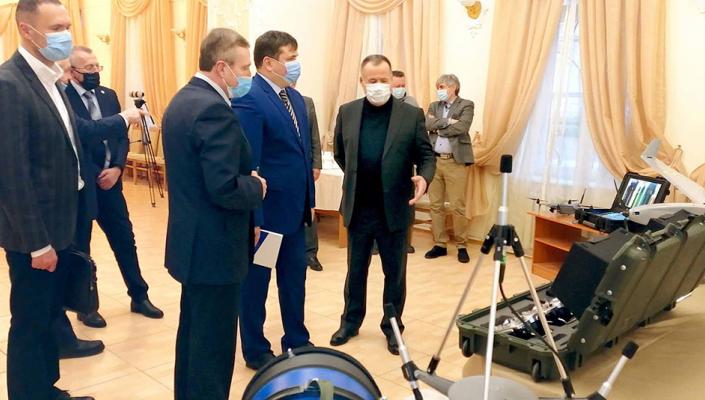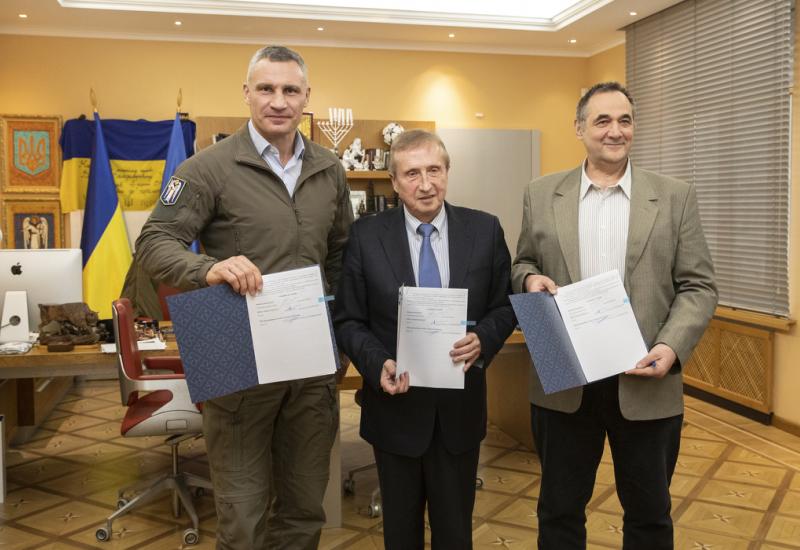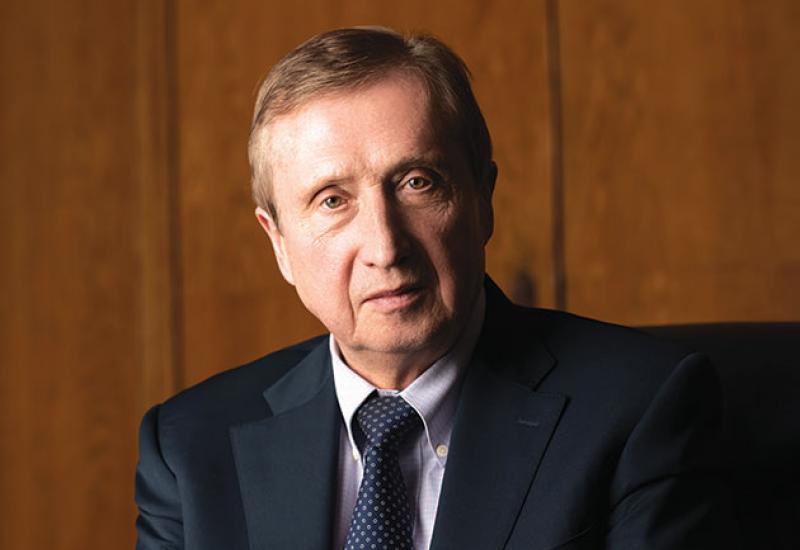At the meeting with “Ukroboronprom” (UOP), Minister of Education and Science of Ukraine Serhiy Shkarlet spoke on leading positions of Igor Sikorsky Kyiv Polytechnic Institute in science and education. The delegation on defense issues included: Director-General of the State Concern UOP Yuriy Husiev, Serhiy Shkarlet, and First Deputy Minister Mykola Kyzym, Head of the board directors of Joint-Stock Company Meridian n.S.P. Korolov Viacheslav Protsenko. The meeting took place on January 11 at the Administrative Council Conference Room of Igor Sikorsky Kyiv Polytechnic Institute.
Igor Sikorsky Kyiv Polytechnic Institute delegates included: Rector of the University Michael Zgurovsky, Head of the Academic Council Mykhailo Ilchenko, Vice-rectors Vitaliy Pasichnyk and Anatolii Melnychenko, Acting Director of E.O. Paton Institute of Materials Science and Welding Yurii Sydorenko, Executive Director of the World Data Center Kostiantyn Yefremov, Director of the Coordinating Center for National Security Education Program A.S. Polishchuk, Сhief engineer of the design bureau “Shtorm” Serhii Puha, Head of the Department of International Economics Serhii Voitko and others.
Michael Zgurovsky drew attention to systematic cooperation between the UOP and the scientific and educational industry. He said, ‘We need to work permanently but not just execute separate orders and make single developments. We have already got acquainted with the American agency responsible for the research and development of military projects DARPA. Moreover, we are trying to establish cooperation with the UOP based on such a program in Ukraine.’
Vice-rector for Scientific Affairs Vitaliy Pasichnyk informed the members of the meeting about the competition for defense technologies. The competition was held within the framework of the Innovation Ecosystem “Sikorsky Challenge”, which was created according to the DARPA model. The competition comprised more than 130 developments able to save people’s lives. The video named “Igor Sikorsky Kyiv Polytechnic Institute for National Security of Ukraine” is also concerned with the same problem. During the discussion, Yuriy Husiev admitted the leading position of Igor Sikorsky Kyiv Polytechnic Institute in producing breakthrough developments for national security. He also emphasized that the gap between scientific centers and defense companies causes change for the worse. Modern armies are strong in new equipment but not in numbers.
As Igor Sikorsky Kyiv Polytechnic Institute based on the Innovative Platforms “Sikorsky Challenge” is qualified in defense industry developments it will become an equal partner of the UOP and the Ministry of Education and Science in August 2021 on the Independence Day of Ukraine. Together they will prepare prototypes of new warfare and demonstrate them to the Head of the Command for the 30th anniversary of Ukraine’s independence. Soon, proper development propositions will be given to the Science and Technology Council of the UOP.
Another issue to discuss was personnel training for the military-industrial complex. The relevant agreement on staff training was assigned four years ago at the Administrative Hall. There is no analog to this program in Ukraine. The program showed a high efficiency: more than 150 managers of different levels have been prepared for the UOP and other authorities of Ukraine. The meeting members watched a video about the managers’ training of the defense-industrial complex and heard feedback on the program. Everyone agreed that the personnel reserve training and the retraining of personnel for the state order is an important part of the cooperation: when the manager knows the business, knows his partners, and the market – the manager is priceless.
As for the rejuvenation of engineering personnel in the industry, Michael Zgurovsky explained that Igor Sikorsky Kyiv Polytechnic Institute has developed programs for training designers who already have experience in production but do not have modern knowledge in certain information or technical systems. The University is ready to do such work quickly in case of state order. He added that purely economic universities will not be able to train technology managers: they will be universal, but detached from production. The Rector gave an example of the University’s successful collaboration with Boeing: ‘Six years ago, Igor Sikorsky Kyiv Polytechnic Institute began training staff for the Boeing Company. We started with 47 of our engineers, who had to train in very special programs. We mastered them. Now their center has more than a thousand engineers. It is our strong cooperation, the most modern level of preparation.’
Due to the crisis of the Ukrainian enterprises, we did not have such productive cooperation, but when necessary Igor Sikorsky Kyiv Polytechnic Institute can support the training/ retraining of personnel for the needs of the national production. The University has a complex of facilities not only for engineers but for office workers and production organizers. ‘Igor Sikorsky Kyiv Polytechnic Institute is more than just a university, indeed. It is a certain system-forming national structure in terms of human capital. Our goal is comprehensive cooperation: innovative developments and retraining.’
During the meeting, the participants also talked about the satellite segment of the University’s developments. Domestic rocket companies are not the only space center in Ukraine that is one of the world leaders in rocketry. The satellite segment requires creating extra scientific schools, which Igor Sikorsky Kyiv Polytechnic Institute does have. The schools can combine very different engineering structures in one system. The University has experience in creating all-Ukrainian satellites, launching them into space, and cooperating in the international arena in the satellite and space segment. Currently, the University is creating two satellite systems, in particular, for probing the Earth with a resolution of 0.5 m.
At the end of the meeting, Yuriy Husiev summed up: ‘Together with Igor Sikorsky Kyiv Polytechnic Institute researchers, we will be able to do a lot and even more for the needs of our army.’




